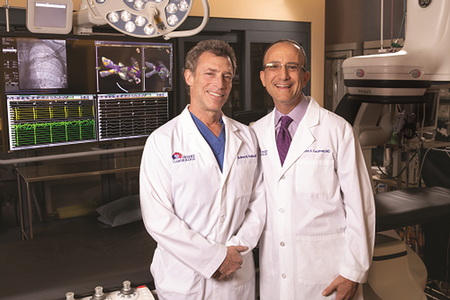



“Afib patients need lifelong anticoagulation therapy, blood thinners, to minimize their stroke risk, which can be as high as eight to ten percent a year,” he says. That’s because afib affects the heart’s ability to pump blood normally, and blood can pool in an area of the heart called the left atrial appendage (LAA) and form a clot.
“If the clot escapes from the LAA and travels to another part of the body, it can cut off blood flow to the brain, triggering a stroke. In fact, in people with afib not caused by a heart valve problem, more than 90 percent of stroke-causing clots that come from the heart are formed in the LAA.
“But many patients have difficulty taking anticoagulation medication, particularly warfarin [brand name Coumadin®], because they experience excessive bruising, or gastrointestinal bleeding,” Dr. Feldman continues. “So, they forego the blood thinner and remain unprotected from stroke.”
People who take warfarin are also at risk of hemorrhagic stroke, a brain bleed, which is the most devastating type of stroke, if they don’t keep their warfarin levels within a specific range. Achieving that tight range requires dietary restrictions and regular blood testing.
“Other afib patients have arthritis and take pain medication that also promotes bleeding, so they often have to choose between pain control and stroke protection,” Dr. Feldman says. “And there are afib patients with active lifestyles whose activities put them at risk of trauma and bleeding, so they’re often forced to choose between anticoagulation and the activities they love. “Due to these concerns, approximately 45 percent of afib patients who should be on anticoagulation therapy are not,” he says. “Between 30 and 40 percent of these patients would benefit from an alternative.”
Now, with WATCHMAN, these patients have another, safer option. And it’s available at Eisenhower.
How WATCHMAN works
WATCHMAN is a permanent heart implant that fits into the LAA to permanently close it off and keep any blood clots from escaping.
“Under X-ray and ultrasound guidance, the device is placed by catheter from the femoral vein in the upper leg to the right atrium of the heart, then into the left atrial appendage,” says Andrew Rubin, MD, Co-Director of Eisenhower’s Electrophysiology Laboratory and Arrhythmia Center, and Board Certified in Internal Medicine, Cardiovascular Disease and Electrophysiology.
“The procedure takes about one hour, under general anesthesia, and the patient goes home the next day,” he continues. “Six weeks after implantation, we perform imaging to confirm the device is properly seated in the LAA and that heart tissue has grown over the implant to form a barrier against blood clots.
“At that point, warfarin or whatever direct oral anticoagulation medication the patient is taking is stopped,” he says. “The patient takes aspirin and clopidogrel (Plavix®) for another four to five months, and then they switch over to aspirin alone on an ongoing basis.”
In clinical trials that led to the WATCHMAN device’s FDA approval in March 2015, 92 percent of patients were able to stop taking warfarin 45 days after the procedure, and 99 percent were able to stop taking it within a year after the procedure. To date, more than 50,000 WATCHMAN procedures have been safely and successfully performed worldwide.
Since Dr. Feldman and Dr. Rubin began performing the procedure at Eisenhower last summer, they have successfully implanted the WATCHMAN device in 50 patients.
At this rate, Eisenhower is on track to become the second-busiest WATCHMAN implant center in Southern California, notes Dr. Feldman. This means that more desert residents with atrial fibrillation who are at increased risk of stroke and are not good candidates for long-term oral anticoagulation will realize the benefits that this procedure confers.
“We hear from patients that they feel relieved and liberated now that they no longer are committed to taking anticoagulation medication,” Dr. Feldman says. “There is almost no patient who isn’t concerned about bruising while on anticoagulation, and it makes them feel vulnerable. With WATCHMAN, they can feel more secure.”
To contact Eisenhower Desert Cardiology Center, call 760.346.0642.